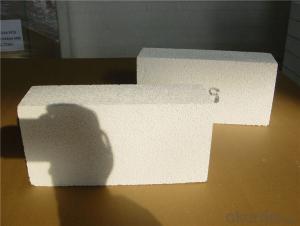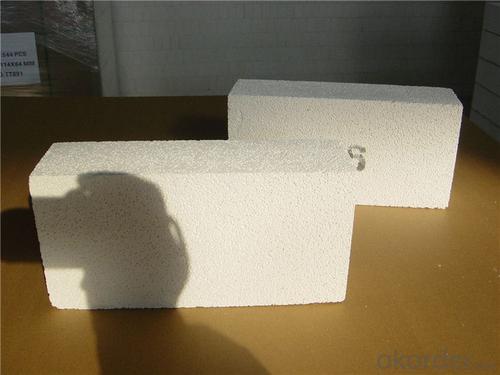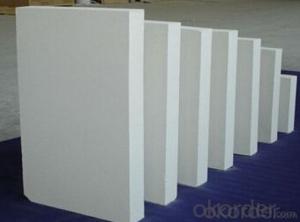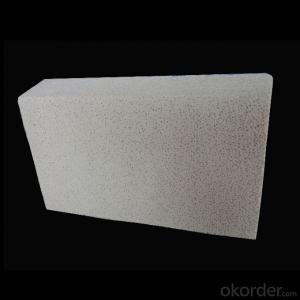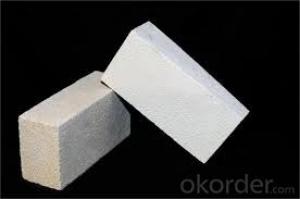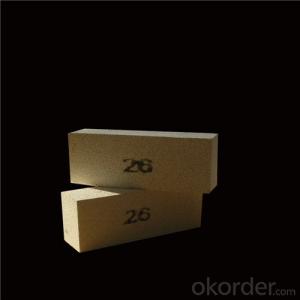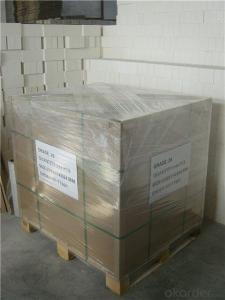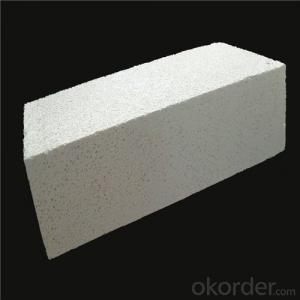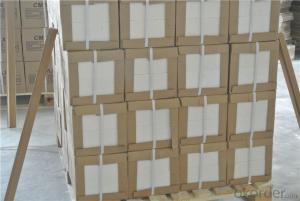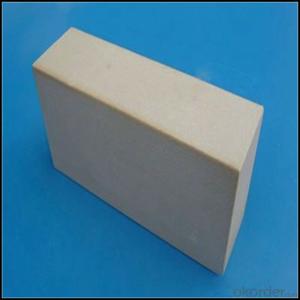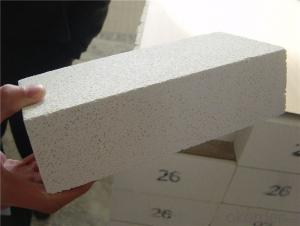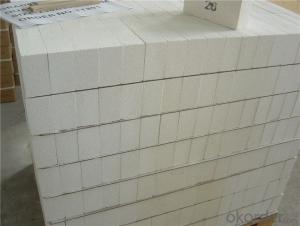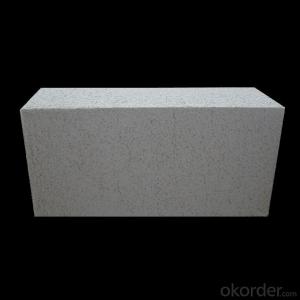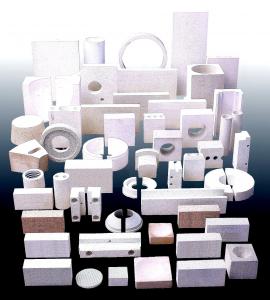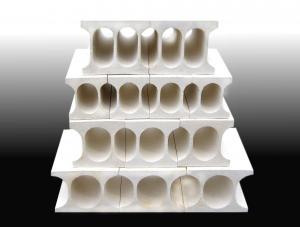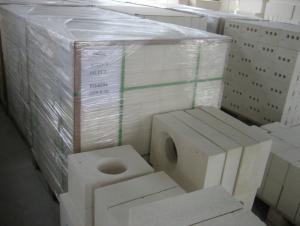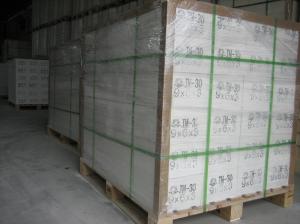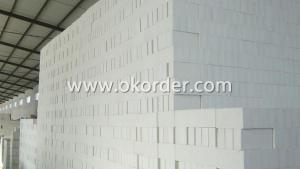High Purity Insulating Fire Bricks - Refractory Clay Insulating
- Loading Port:
- Tianjin
- Payment Terms:
- TT OR LC
- Min Order Qty:
- 10 m.t.
- Supply Capability:
- 10000 m.t./month
OKorder Service Pledge
OKorder Financial Service
You Might Also Like
CNBM conforms strictly to the requirements of ISO 9000 quality control system during the production. MSDS is also available if you want. The thermal insulation fire clay brick meet with the requirements of ASTM & JIS standards. So please stay cool with our quality.
Application
Insulating Fire Brick are used for the lining of converter, alternating current arc furnace, direct Current arc furnace and the ladle slag line, etc.
Insulating Fire Brick Technical index
Brand Quality | JM23 | JM26 | JM28 | JM30 | JM32 | |
Bulk Density (g/cm3) | 0.52 | 0.78 | 0.88 | 1.03 | 1.25 | |
1.2 | 1.6 | 2.1 | 2.5 | 3.5 | ||
Modulus of Rupture (Mpa) | 0.9 | 1.4 | 1.6 | 2.1 | 2.1 | |
-0.5 | 1400℃ -0.4 | 1510℃ -0.5 | 1620℃ -0.9 | 1730℃ -0.9 | ||
Thermal Expansion 1100℃(%) |
0.5 |
0.7 |
0.8 |
0.9 |
1.1 | |
Thermal conductivity(W/m.k)
| 400℃ | 0.14 | 0.27 | 0.32 | 0.41 | 0.49 |
600℃ | 0.16 | 0.29 | 0.34 | 0.43 | 0.50 | |
800℃ | 0.18 | 0.31 | 0.36 | 0.44 | 0.51 | |
1000℃ | 0.20 | 0.33 | 0.38 | 0.45 | 0.53 | |
Al2O3 | 37 | 58 | 67 | 73 | 77 | |
Fe2O3 | 0.7 | 0.7 | 0.6 | 0.5 | 0.4 | |
Equipment
1 unit of Ceramic Abrasive (SG Abrasive) pilot production line
2 units of Compact grain Abrasive pilot production lines
1 unit of high-end coated abrasives (abrasive cloth) production line
2 units of Boron Carbide production lines
3 large flexible crushing and sieving lines for grit production lines
2 units of 2000KVA furnaces for Boron Carbide fusion
6 units of 5000KVA-10000KVA dumping type electric arc furnaces for Brown Fused Alumina fusion
Company Advantage
(1)Long Insulating Fire Brick manufacture history: 25 years manufacturer
(2)Advanced equipment
(3)Diversification of production standards: ISO ANSI FEPA JIS ASTM
(4)Flexible payment: T/T L/C D/P D/A
(5)Professional marketing team and after-sale service
(6)Free sample
FAQs
Q1 |
What’s the transport method? |
A1 | FCL delivery goods with wooden pallet or wooden case by sea; If LCL delivery, must with wooden case; Sometimes need open top, flat rack or bulk cargo. |
Q2 |
What’s the required payment term? |
A2 | Generally 30% TT as the prepayment, 70% TT before delivery. If need, 100% Irrevocable Letter of Credit or negotiation. |
Q3 |
Which country are our products exported to? |
A3 | Apart from entire Chinese market, the US, Russia, Japan, Korea, Australia and some Southeast Asian Nations. |
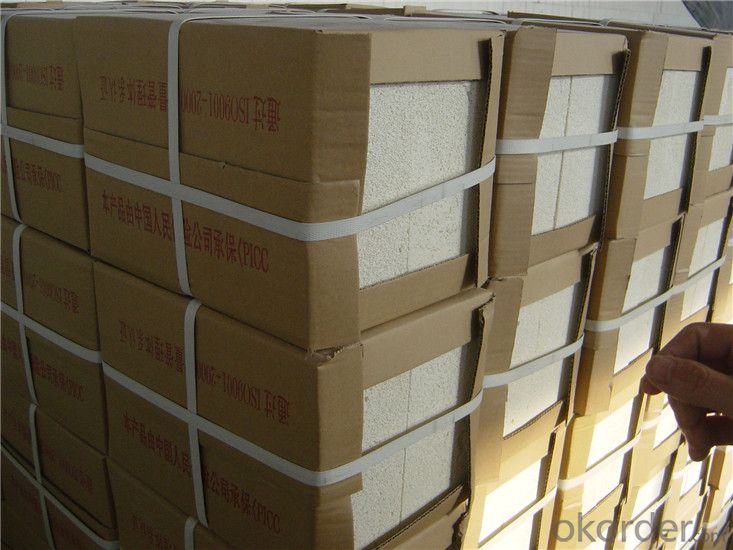
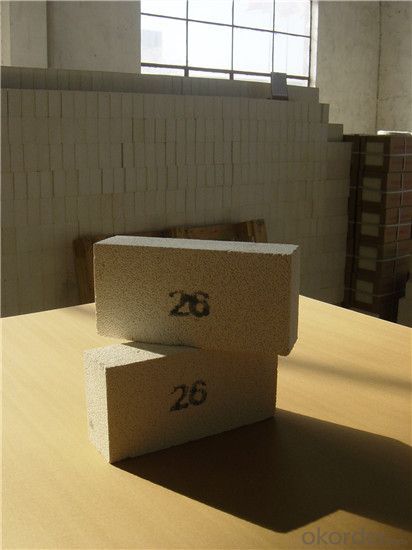
- Q: Can insulating fire bricks be used in the construction of pizza ovens?
- Yes, insulating fire bricks can be used in the construction of pizza ovens. These bricks have excellent heat retention properties which help to create a high and even temperature inside the oven. Additionally, their insulating properties help to decrease heat loss, making them ideal for pizza ovens where maintaining a consistent and high temperature is crucial for achieving crispy and delicious pizzas.
- Q: Are insulating fire bricks suitable for thermal insulation in boilers?
- Yes, insulating fire bricks are suitable for thermal insulation in boilers. They have high thermal conductivity and can withstand high temperatures, making them an effective choice for insulating the walls and floors of boilers. Their ability to retain heat helps in improving energy efficiency and reducing heat loss, ultimately enhancing the overall performance of the boiler system.
- Q: Can insulating fire bricks withstand thermal shock?
- Insulating fire bricks possess exceptional thermal insulation properties and are commonly employed in situations where thermal shock does not pose a significant issue. While these bricks can endure moderate temperature fluctuations, they are not explicitly engineered to withstand thermal shock. Thermal shock arises when there is an abrupt alteration in temperature, leading to strain and possible harm to the substance. Insulating fire bricks are more vulnerable to thermal shock in comparison to dense fire bricks, which are explicitly crafted to endure drastic temperature variations. If thermal shock is a concern in your application, it is advisable to contemplate alternative refractory materials that are specially designed to withstand rapid temperature changes.
- Q: What are insulation bricks for? Do not use high-rise buildings on the ah?
- Heat preservation bricks are of course used for insulation... Tall buildings should not be used
- Q: Are insulating fire bricks suitable for use in boilers?
- Yes, insulating fire bricks are suitable for use in boilers. They have excellent thermal insulation properties, which help to minimize heat loss and increase energy efficiency in boilers. Additionally, their high temperature resistance ensures they can withstand the extreme heat generated within the boiler.
- Q: Are insulating fire bricks resistant to phosphoric acid?
- Insulating fire bricks are generally not resistant to phosphoric acid. Phosphoric acid is a strong acid that can react with and corrode many materials, including fire bricks. While some fire bricks may have a certain level of resistance to acidic environments, it is unlikely that insulating fire bricks would be able to withstand prolonged exposure to phosphoric acid without significant deterioration. It is therefore recommended to use acid-resistant materials, such as acid-resistant bricks or linings, when dealing with phosphoric acid or other strong acids.
- Q: Can insulating fire bricks be used in thermal power plants?
- Yes, insulating fire bricks can be used in thermal power plants. Insulating fire bricks are designed to provide thermal insulation and resist high temperatures, making them suitable for applications in thermal power plants. These bricks can be used in various areas of a power plant, such as in the lining of boilers, furnaces, and kilns, where they help to reduce heat loss and increase the overall energy efficiency of the plant. Additionally, insulating fire bricks are lightweight and have good thermal shock resistance, allowing them to withstand the extreme temperature fluctuations that occur in power plant operations.
- Q: What material is good for indoor thermal insulation?
- Now the main building to do insulation, and generally use benzene board, we do indoor heat preservation is generally used, glass cotton is glass fiber, contact the skin after particularly uncomfortable
- Q: Can insulating fire bricks be used for insulation in boilers?
- Yes, insulating fire bricks can be used for insulation in boilers. These bricks are designed to withstand high temperatures and are highly effective in retaining heat, making them suitable for insulating the walls and floors of boilers.
- Q: What is the average density of insulating fire bricks?
- The specific composition and manufacturing process of insulating fire bricks can cause the average density to vary. Generally, insulating fire bricks possess a lower density than regular bricks. The average density of insulating fire bricks typically falls between 0.6 grams per cubic centimeter (g/cm³) and 1.5 g/cm³. This reduced density is accomplished by incorporating lightweight materials or incorporating air pockets during manufacturing. The lower density of insulating fire bricks enables them to offer exceptional thermal insulation properties, rendering them well-suited for applications that require containment of high temperatures while minimizing heat loss.
Send your message to us
High Purity Insulating Fire Bricks - Refractory Clay Insulating
- Loading Port:
- Tianjin
- Payment Terms:
- TT OR LC
- Min Order Qty:
- 10 m.t.
- Supply Capability:
- 10000 m.t./month
OKorder Service Pledge
OKorder Financial Service
Similar products
Hot products
Hot Searches
Related keywords
